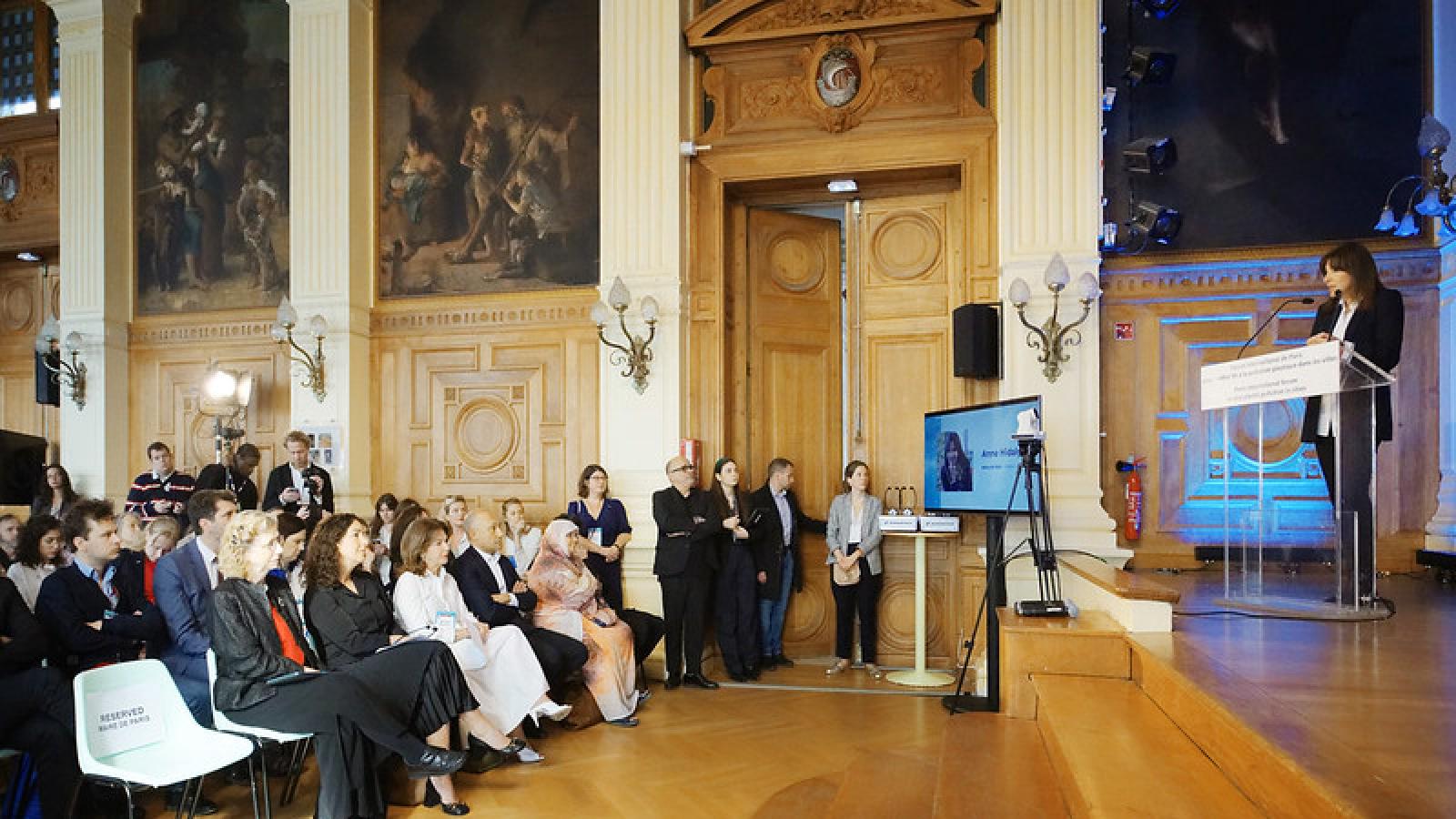How Cities are Leading in the Fight Against Plastic Pollution
At the Paris International Forum to End Plastic Pollution in Cities, global mayors shared insights on the power of local action to limit waste and transition to a circular economy.
Paris Mayor Anne Hidalgo addresses the audience at the Paris International Forum to End Plastic Pollution in Cities (Photo: Thierry Lewenberg-Sturm)
“Plastic kills, and the damages of plastic pollution have no borders. We cannot beat plastic pollution if we don’t tackle climate change, environmental loss and food crises at the same time.”
That was the powerful message Paris Mayor Anne Hidalgo delivered during the Paris International Forum to End Plastic Pollution in Cities. The event was held before the second session of the Intergovernmental Negotiating Committee (INC) on Plastic Pollution, which aims to develop a legally binding international instrument on plastic pollution, including in the marine environment. Over the course of a morning filled with presentations, roundtables, and calls to action, global mayors, scientists, and representatives from NGOs and philanthropies united to discuss the crisis of plastic pollution, and how cities can lead the way on solutions.
Cities and Plastic Pollution
Plastic waste is currently choking our environment and our oceans. As the world has rapidly urbanized, consumption has increased and cities are left to cope with huge quantities of waste produced every day. About 400 million tons of plastic waste is generated every year, of which 288 million tons comes from municipal solid waste streams, comprising up to 75% of the total plastic waste generation. The amount of this plastic waste that makes it into waterways and oceans reflects the overwhelming task of managing pollution. UN Habitat estimates that around 60.1 million tons of plastic from municipal solid waste streams pollute the environment each year and around 11 million tons flow into the ocean.
Our current status quo around pollution reflects a dual crisis of overproduction of plastic and waste management failure. The flow of waste into natural habitats is harmful to ecosystems and people: chemicals can leak from discarded materials into the ocean and marine life, and microplastics (tiny fragments derived from plastic waste and industrial processes) can also contaminate water and seafood supplies. And current waste management practices, like landfills and waste incineration sites, expose nearby communities to toxic chemicals released by plastic burning.
Currently, 2 billion people worldwide lack access to solid waste collection, and 3 billion people lack access to controlled solid waste disposal facilities. The need to reduce our reliance on plastic production and improve plastic waste management is a global issue, and one that connects to the efforts to mitigate climate change, stop biodiversity loss, and curb pollution. Moreover, the urgent need for action is evident at the city level, particularly in impoverished areas, where basic waste collection services are most lacking. If no action is taken, the crisis of plastic waste in cities will continue to intensify and exacerbate inequities in health and quality of life.
How Cities are Leading on Solutions
While curbing plastic waste in cities will take a monumental effort, cities are rising to the challenge.
Throughout the Forum, city leaders shared innovative local solutions for curbing the upstream and downstream plastic waste impacts, many of which are catching on across the globe. Single-use plastic bag bans have proved extremely effective. Inger Andersen, Under-Secretary-General of the United Nations and Executive Director of the UN Environment Programme, cited Rwanda’s successful effort, in 2008, to ban plastic bags and instead promote alternative materials like bamboo and paper for packaging, as an example that many other cities have followed. Following her speech, Bima Arya Sugiarto, Mayor of Bogor, Indonesia, shared his city’s groundbreaking initiative to ban single-use plastic bags in markets. Faced with initial pushback, Bogor conducted a massive campaign throughout the city, engaging women and young people, and sharing messages and facts through social media. Eventually, the city succeeded in implementing the policy. “The key is communication and socialization,” Sugiarto said. To date, the policy has reduced plastic bag usage by 34% and increased eco-friendly shopping bag usage by 70%.
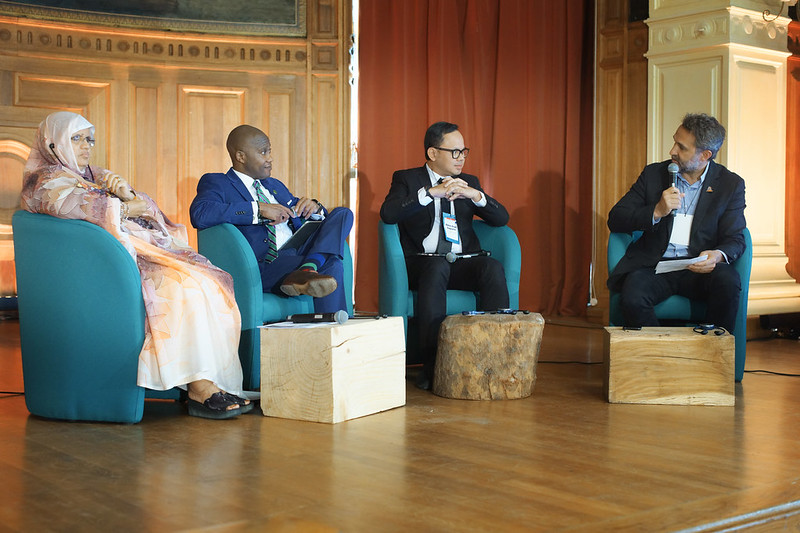
As we try to move away from unnecessary plastics, creating schemes to incentivize recycling is also critical in Global South cities, according to Mayor Joy Belmonte of Quezon City, Philippines. Under her leadership, Quezon City created a “cash for trash” program that enables residents to exchange recyclable plastics for environmental credits, which they can use to purchase essentials like rice and eggs and pay for utility bills. As Quezon City, with the support of C40 Cities, aims to transition to a circular economy and substantially reduce waste, creating more robust recycling and waste-reduction programs is essential.
While every city faces unique challenges in reducing plastic waste, the mayors and city leaders were energized by the potential of engaging youth and women in the effort to beat plastic pollution. Bogor, Sugiarto said, has a partnership in place with a Millennial-led startup that’s transforming plastic into eco-planks and eco-pavement for construction projects, and recycling five tons of plastic each day in the process.
Across the world in the United States, young people are supporting cities along the Mississippi river to conduct data collection to determine what are the sources of plastic pollution in that critical waterway, Greenville, Mississippi Mayor and Chair of the Mississippi River Cities and Towns Initiative Errick D. Simmons told the audience. Supported by UNEP, the Mississippi River Plastic Pollution Initiative is leaning on a citizen-science approach and community engagement and buy-in to tracking and managing plastic waste entering the river.
In Ambikapur, India, Commissioner Pratistha Mamgain shared with the audience the city’s local, sustainable, women-led waste management model—for which it was named India’s cleanest small city in 2017. Through Ambikapur’s program, 470 women waste pickers, who operate as independent entrepreneurs, conduct door-to-door waste collection and oversee transportation and sorting. The women entrepreneurs, called Swachhta didis, sort the waste into 156 different categories, ensuring organic materials are composted, and inorganic materials are either sold off to recyclers or repurposed into materials like plastic pellets or cement. This model, Mamgain said, has improved accountability in the waste management sector and, by formalizing waste picking work, has created economic stability for the women who lead the network. "We needed to look inwards and adopt a local, sustainable approach that would make use of resources available,” she said.
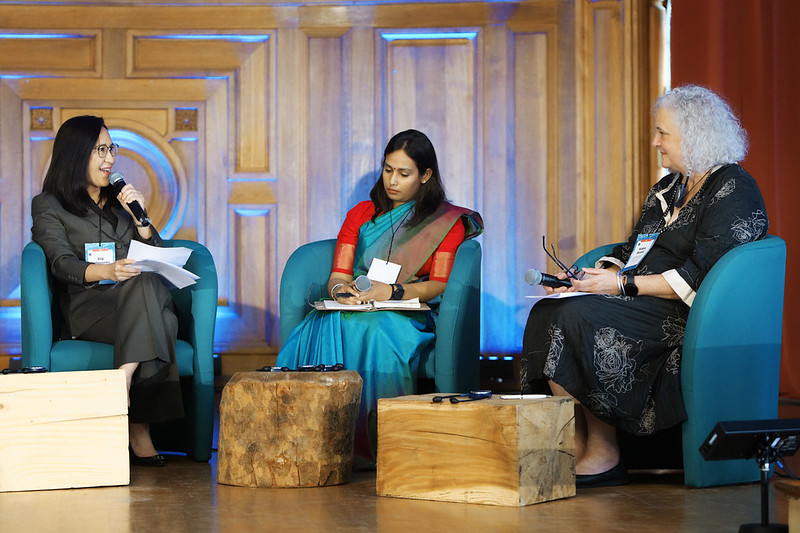
The Need for A Global, Legally Binding Approach to Plastics
Leaders at the Forum envisioned a clear path forward. Cities should be able and have the responsibility to lead on the issue of plastic pollution. Cities must be ambitious in their endeavors. Indeed, Mayor Hidalgo shared Paris’ ambitious plan to ban single-use plastics from the 2024 Olympics, demonstrating the strength of more sustainable alternatives at the local level.
While individual cities have made enormous strides on managing and reducing plastic waste, all stakeholders present agreed that they can’t and should not have to face this challenge alone. As the second session of the INC on Plastic Pollution gets underway in Paris, the Forum sent a clear message that a global framework and treaty for curbing plastic waste is essential. As cities continue to innovate, they should have the support of a global framework and legal structure to advance their actions. “The plastic treaty provides hope,” Greenville Mayor Errick Simmons said. “Cities cannot do it alone, governments cannot do it alone, individuals cannot do it alone.”
“Cities need the whole system behind them,” UNEP Executive Director Inger Andersen said. “We need to involve actors in the value chain from the beginning to the end, and the global agreement that we hope to land on has to be one that empowers and enables, so that we can close the waste management gap. We want ambition, we want legally binding, and we want control measures in this agreement.”
Join the fight against plastic pollution!
This 5 June, for World Environment Day, join millions around the world to #BeatPlasticPollution and share your work!
UNDP and UrbanShift, together with the UN SDG Action Campaign and UNEP, have developed a series of media assets available for cities and local governments to share their local action to beat plastic pollution.
The editable media cards are available for editing and downloading in Canva, feel free to adapt, and use freely. You can add your own messages, include your own logos and share the word! Some examples can be found here.
This event was organized in partnership with:
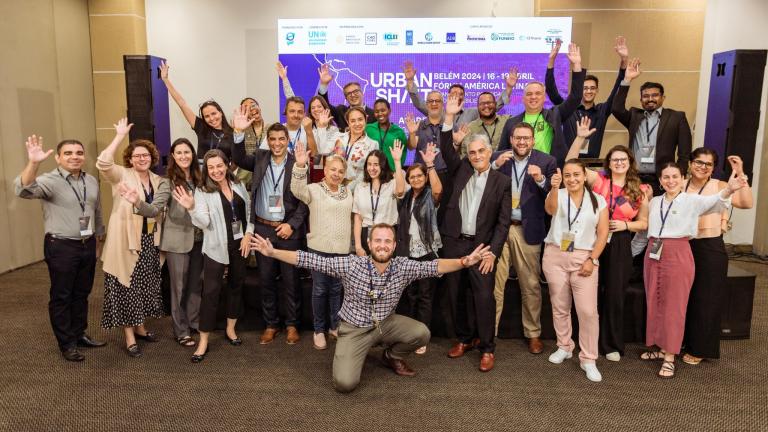
Circular Cities at the Forefront: Insights from UrbanShift's Latin America Forum
Cities can play a major role in reducing waste, improving efficiency, and spurring sustainable economic transformations. Learn how the UrbanShift Latin America Forum elevated the idea of a circular economy for cities.

China City-Business Collaboration Accelerator (CiBiX) Workshop
This workshop will accelerate public-private collaboration around waste reduction, management, and reuse in Chengdu.
Exploring Sustainability in Shenzhen: An Exchange on City-Business Cooperation
Shenzen is a leader in nature-positive, low-carbon development. This UrbanShift Peer-to-Peer Exchange highlighted ideas for how cities across Asia can learn from their innovation.
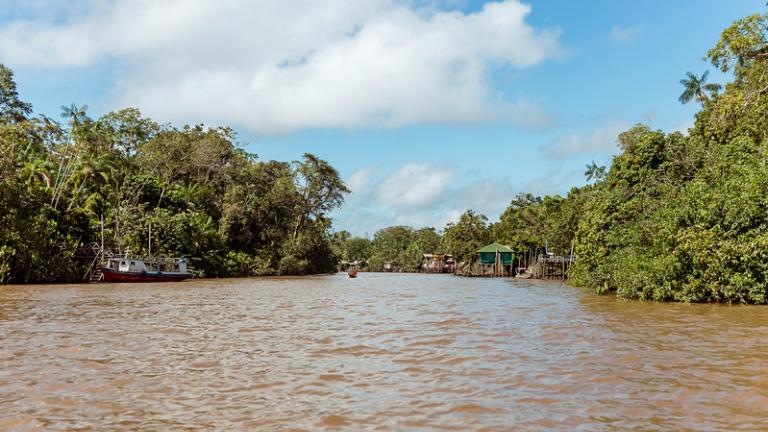
How an Urban Bioeconomy can Promote Healthy Ecosystems and Spur Sustainable Economic Prosperity
In Belém, Brazil and other Latin American cities, this concept—which emphasizes circularity, renewable resources, and the development of green infrastructure—is already taking root and reshaping local economies.
